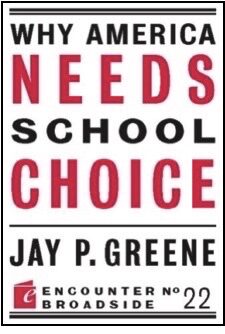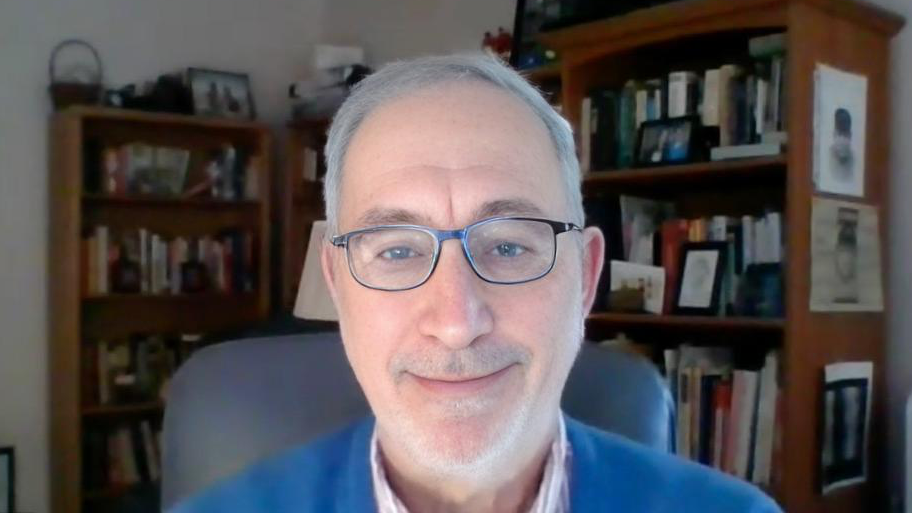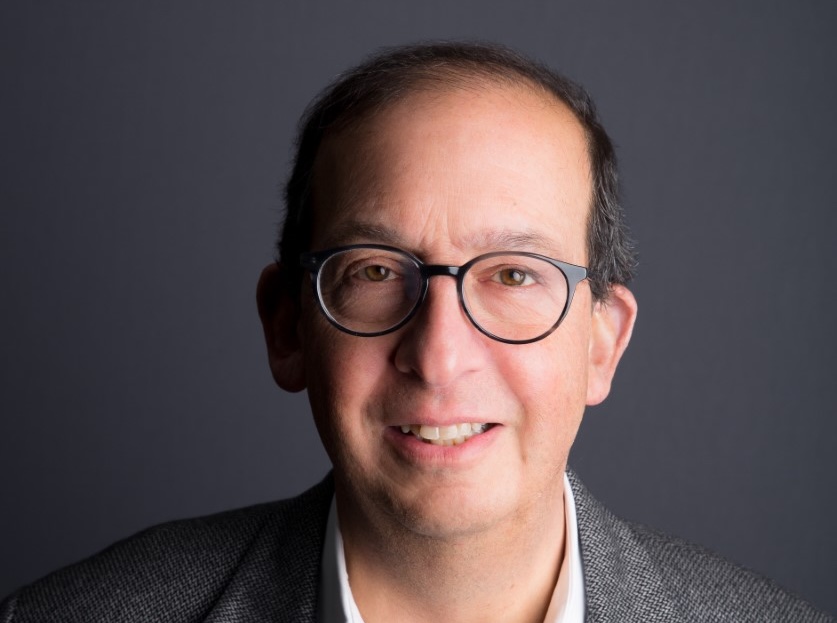The Department of Education Reform chair talks about education-reform philanthropy and that which animates it, as well as Teach for America.
Jay P. Greene is a distinguished professor and chairs the Department of Education Reform at the University of Arkansas in Fayetteville, Ark. He has long studied the various effects of school-choice programs, including in the forms of vouchers and charter schools.
Greene’s academic research was cited four times in the U.S. Supreme Court opinions in 2002’s Zelman v. Simmons-Harris case, which upheld the constitutionality of the Cleveland choice program’s inclusion of religious schools against a challenge that it violated the First Amendment’s Establishment Clause.
His other current scholarly interests also include schools’ effects on non-cognitive and civic values, as well as culturally enriching field trips. In addition to education, he has published work on political science, public policy, government, sociology, and public policy.
Previously, Greene has been a professor at the University of Texas and the University of Houston. He was also a fellow of the Manhattan Institute. He earned his bachelor’s degree in history from Tufts University and his Ph.D. in government from Harvard University.
He blogs at Jay P. Greene’s Blog and his Twitter handle is @jaypgreene. A recent provocative blog post about philanthropic failures in education reform, “What Do Education Reform Failures Have in Common?,” caught our attention at The Giving Review and, we thought, warranted further exploration.
Below is the first of two parts of an edited transcript of a discussion that Greene was kind enough to have with me in September. The second part—in which he talks about philanthropic ed-reform strategies, including the Gates Foundation’s, and learning from failure, or not—is here.
Hartmann: Where’s home?
Greene: I grew up in suburban Chicago, then went off to Tufts in Boston for undergraduate and Harvard for graduate school. Then, I was a professor in Texas, both at the University of Houston and University of Texas, and then eventually made my way over to the Manhattan Institute—but I did so working from Florida, which is the ideal arrangement of New York salaries and Florida taxes and weather. It’s an arrangement I recommend. From there, we moved to Fayetteville, Arkansas, where the University of Arkansas is located, and I’ve been here now for almost 15 years.
Hartmann: You are a very smart guy you could have probably studied a lot of things, if you wanted to be an academic, or done a lot of things if you wanted to be something else. Why education reform?
Greene: Interestingly, I didn’t think I could study education policy. When I entered graduate school in political science, education policy was not really an acceptable topic. It wasn’t the kind of thing a political scientist did. We studied institutions and public opinion and various other things, but policy was considered lowly to political scientists.
Even though I was interested in education policy, I didn’t pursue it. When I finished graduate school and had we had our first kid, I decided that I really cared about this topic enough that I just wanted to do it. I got hired in my first academic job as a Congress expert, a legislative-politics expert, but started publishing in education reform right away.
The reason why I drifted into education reform from legislative politics was not only just because I suddenly realized it was possible to do it, but also because I began to think with alarm about what would happen to my kid. I began thinking, Who was I going to be handing him over to help raise? Who were these people, and how would they be doing it, and how could I help ensure that they would be good for him?
Those kinds of anxieties helped drive me more towards the topic. I think that this is a pretty-typical trajectory, where people begin to realize the things around them are actually pretty darn important, and not just things far away.
Hartmann: Is it fair to characterize you and your work as receptive to school choice and, if so, why? Where does that come from?
Greene: I have a set of values that I hold dear and core among those values is the idea that children should primarily be raised by their parents.
I see education as an extension of child-rearing, part of what we do to prepare our children for adult lives. Child-rearing should primarily be done by parents, or by people selected by parents, absent evidence of abuse or neglect. In fact, this is the historically normal way in which children have been raised. They have been raised by their parents, or by people selected by their parents, and the institution of schooling and then industrial-scale schooling is a very modern and unusual invention—without a long track record to judge and in that short time, it has a fairly spotty record.
Now that being said, of course, I’m also an empirical researcher and I ask empirical questions and I try to study them and answer them using rigorous methods and give honest answers. But it would be completely disingenuous of me not to reveal what my preferences are, and I think this is true of every other researcher, whether they’re as candid about it as I am.
Hartmann: Are those values and those positions held against you by peers of yours in academia?
Green: Mostly by opposing advocates. Academics tend not to resort to ad hominem out loud, but they may think it in their heads, I don’t know. But yes, it’s a weapon that’s used to delegitimize other people’s research
If you try to ask good questions and answer the questions using rigorous methods, then it doesn’t really matter what your preferences are. Now, that being said, our values shape to a great degree what kinds of questions we ask and how we interpret the answers. I don’t want to suggest that social science is this dry, neutral exercise where values don’t matter. They do matter quite a lot.
Hartmann: Have you found there to be benefits from school choice and, if so, what are they?
Greene: I’ve done a variety of different studies on school choice policies, both private school choice and charter-school choice, and I’ve found that private school choice improves academic outcomes for students, that it improves civic outcomes for students, and it can be done at lower cost. These findings are widely replicated. Again, though, I think the primary case for school choice really has to do with fundamental values more than it has to do with these empirical findings.

Hartmann: So if there have been three “legs” to the “stool” of the school-choice argument and the coalition making it—civil rights, the free market and market-based proposals as a way to try helping solve social problems, and basically religious freedom—was the market-based leg overemphasized early on?
Greene: I think it was. I mean, in fact, it’s the one that drew me into school choice to a great degree early, and I had a big part in promoting that argument, but I don’t think it’s the main and best argument for school choice. I think it’s not just the idea of religious liberty, but the ideas of authentic community formation and individual liberty. I think those are the main arguments in favor of school choice.
The purpose of the money, and the pitfalls of some models
Hartmann: Your first familiarity with philanthropy was as a grantee, right, for some of this research?
Greene: I’ve received money from a wide range of philanthropic organizations, including all of the major actors in the education-reform space, and I’m very grateful for the support that they’ve given me over the years and the work it’s allowed me to do.
Now, that being said, I think that they have increasingly turned in counterproductive directions. The more I get to know them, the more I think of them as fairly dysfunctional organizations.
Hartmann: You’re in Arkansas. People are going to assume you’re heavily funded by the Walton Family Foundation.
Greene: I should be clear that I’m not primarily talking about the Walton Family Foundation. I have no privileged access to Walton. People think that I have a “bat phone” over to Walton headquarters in Bentonville, but the truth is I hardly hear from them, which itself is a weird thing. My interactions with philanthropic organizations over the last decade have largely been with organizations other than Walton.
Hartmann: Is there donor fatigue with school choice?
Greene: I think there’s donor fatigue with education reform in general and with school choice in particular. We keep producing new billionaires, though, and so it doesn’t seem to end. One may drop out and others join.
My main concern with the role of philanthropy in education isn’t that we’re running out of patience or running out of their money. I don’t think that’s the issue. The issue is that foundations are beginning to steer education reform in counterproductive directions. It’s not that we need more philanthropic money. It’s that their money is actually often being used badly. In fact, sometimes I think we have too much money sloshing through education reform. It might be healthier if we had less funding.
Hartmann: What are those counterproductive directions?
Greene: If I had to try to lump it all into a big overarching theme, it would be that the philanthropic role in the education-reform movement has shifted toward more top-down solutions that allow folks to appear righteous in elite circles, but that are very unlikely to succeed politically, and even if they could, are very unlikely to improve education for children. It’s paradoxically become more and more about the people who work in the ed-reform space—enhancing their virtue-signaling with maintaining a feeling of control—as opposed to the people that they claim to be working for, despite very strong rhetoric to the contrary.
Hartmann: Well, what’s causing this? The new people?
Greene: The education-reform movement is a political movement, and the shocking thing about philanthropies is how bad at politics they are. Part of the problem is that philanthropic money can buy mercenaries, but it can’t buy constituents. Philanthropic organizations too easily forget this and are often deluded into thinking that their top-down solutions have broader political support than they actually do.
They don’t really live in a world of political action. They live in a world of giving grants to people who will reinforce things that they believe. It’s extremely hard for philanthropic organizations to get honest feedback about what seems sensible or not.
I actually sympathize quite a lot with the people who work in philanthropies and with the philanthropists themselves. There are tons of people who want things from them. That distorts all of the information that they get from those people, which makes it very hard for these organizations to learn.
Ultimately, what you really need to be successful in a philanthropic organization pursuing political change, which is what the ed-reform movement is about, is wisdom and experience—and these are the two things that are in remarkably short supply.
We’ve had a rise of young people lacking in wisdom and experience, but very strongly equipped in technical skills and in adopting positions favored in elite circles. They understand technical issues, particularly technical issues regarding research, better than philanthropists of the past. But that’s not really their problem. Their problem is understanding a sensible political strategy.
In concrete terms, a big way that ed reform has gone off the rails is by very narrowly focusing reform efforts on the most-disadvantaged kids. They rightly think that these are the kids who need reform the most, that they deserve it the most, and then they receive the most praise for focusing on the most-disadvantaged.
The difficulty with that, from a political perspective, is that the most-disadvantaged are not likely to be in a position to organize and effectively advocate for policies focused on benefitting them. But if programs were expanded to include the upper-middle class as beneficiaries, the poor can also benefit from programs that more-advantaged folks have a vested interest in creating and sustaining. People organizing to pursue their self-interest is a basic principle of politics, but rather than appealing to self-interest and channeling it toward a broader good, education-reform strategies have relied on trying to shame the upper-middle class into supporting their efforts. Or ed reformers have invoked the authority of science to gain upper-middle class support.
As it turns out, advantaged people don’t have to believe your conception of what justice requires and they don’t have to believe your science. If it doesn’t appeal to their interests, they find ways to rationalize opposing education-reform proposals, which they often do.
Hartmann: Didn’t proponents have to focus on the most-disadvantaged to get a law passed?
Greene: No. It may have been true with the early choice programs—we’re talking Milwaukee and Cleveland in the early 1990s. It may have been the case that the only way you could get a program through at all was if you focused exclusively on the most-disadvantaged kids, because then people were desperate for solutions and open to the possibility that the solutions would be something dramatically different from what they have tried in the past.
But once proof of concept had begun to be established and once it was demonstrated that the sky wouldn’t fall—that, as David Berliner, said, we wouldn’t have ethnic cleansing as in Kosovo as a result of private school choice—once we had established those things, I think we were actually free to move those programs more towards serving the middle class and including the upper middle class.
The charter-school movement, however, was never required to exclusively serve the most-disadvantaged, since there’s no means testing for charter schools. They could have opened and focused on charter schools that were serving a great variety of potential constituents.
The school-choice movement, to the extent that it invested in charter schools, really invested in models that were focused on the most-disadvantaged even when they didn’t have to. In fact, a lot of attention was steered away from private school choice towards charter-school choice, with the charter schools almost exclusively focused on the most-disadvantaged. The turn in the school-choice movement a little more than a decade ago was very heavily in that direction.
Hartmann: And that was a philanthropic-driven turn …
Greene: I don’t think politics required it, so philanthropists were making choices about which startups to invest in and scale. They saw models of success in serving the most-disadvantaged, and those were the models that they heavily invested in.
Another major difficulty in the school-choice movement and the ed-reform movement more generally was the use of Teach for America as a pipeline to staff the education-reform world. Early on, the backers of Teach for America understood that they weren’t primarily recruiting people to serve long-term in schools, and they weren’t embarrassed about this. They said it’s no problem that people don’t stay in teaching. It’s fine. If they go on to do other things, they’ll become the leaders of this new reform movement. They’ll create new organizations. They’ll maybe create new school models. They’ll help staff the foundations and think tanks and so on, and they did all those things. The problem is that they built a very ideologically narrow pipeline.
They appealed to social-justice oriented, elite-college kids to do the equivalent of the Peace Corps, but do it in big cities in the U.S. They drew kids with a certain conception about the world, and then very quickly, those people became the leaders of education-reform organizations. They became the program officers and eventually senior staff at the foundations. They were all tightly connected to each other. They all shared a very particular worldview. They began handing money to each other, creating each other’s organizations, serving on each other’s boards, attending each other’s gatherings, and making speeches to each other. It became a very intellectually incestuous group.
Hartmann: It was their own well-credentialed, progressive elites?
Greene: Right. Even when they received legitimate criticism for the lack of diversity within their ranks, they responded to this by looking for superficial characteristics of diversity like skin color, as opposed to deeper types of diversity, like worldviews or the types of experiences that would lead one to different worldviews.
Hartmann: TFA would have been better to have arisen out of the Big Ten or the SEC or the Big 12?
Greene: Well, the whole idea that you should create this pipeline to staff the entire world of ed-reform was dangerous. It’s nice when philanthropies actually organically grow out of their own communities and experiences, and then can add to the mix those particular perspectives. It also helps them within those organizations function better, because they share within those organizations certain ideas about the world. Those ideas that they have about the world are very different from those found in other organizations. You’d have a diversity of philanthropic organizations out there.
If you look at the giving of the biggest organizations in education reform—a number of people have documented this—their giving overlaps. They have common strategies. They saw that as a virtue, that they were coordinating and therefore having bigger impact. What they instead were doing was compounding errors by making identical mistakes, and failing to learn by failing to try different things, by failing to see what could work.
Most things are going to fail. Education reform is really hard. Philanthropy is really hard. Most things are going to fail. Everyone should be comfortable with that reality. It’s really important to learn from that failure, and I think philanthropies have not been set up as learning organizations, especially when they’re part of a very insular and driven worldview that cannot falsify itself.
The conversation continues in Part 2 of 2 here.


